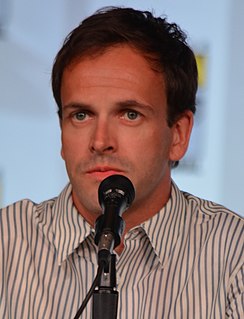A Quote by Alan Lightman
Don't you feel something magical when you're in love?... I do, I certainly do ... but I think that feeling of magic is a hardwired psychological response. It's a chemical thing in the brain. It's a flow of chemicals and electrical currents, and it developed over millions of years in the process of evolution to aid in the procreation of the species.
Related Quotes
All that's known is this: there is no central processor, no single computer. Nothing that simple. Millions of neurons process information simultaneously and in parallel, not linearly, but the actual chemistry and electrical properties of that integrative process are still being mapped. Even so, it seems odd that during the evolution of brain circuitry and thinking, the ability to understand itself did not get wired in. Such built-in innocence seems like a terrible oversight.
The brain is a tissue. It is a complicated, intricately woven tissue, like nothing else we know of in the universe, but it is composed of cells, as any tissue is. They are, to be sure, highly specialized cells, but they function according to the laws that govern any other cells. Their electrical and chemical signals can be detected, recorded and interpreted and their chemicals can be identified; the connections that constitute the brain's woven feltwork can be mapped. In short, the brain can be studied, just as the kidney can.
Thoughts are no more than electrical surges in the brain. Sexual arousal is no more than a flow of chemicals to certain nerve endings. Sadness is no more than a bit of acid transfixed in the cerebellum. In short, the body is a machine, subject to the same laws of electricity and mechanics as an electron or clock.
You can imagine a different world in which a number of species developed with different genetically determined linguistic systems. It hasn't happened in evolution. What has happened is that one species has developed, and the genetic structure of this species happens to involve a variety of intricate abstract principles of linguistic organization that, therefore, necessarily constrain every language, and, in fact, create the basis for learning language as a way of organizing experience rather than constituting something learned from experience.
You are not exposed to one chemical at a time, but a complex mixture of chemicals that changes day by day, hour by hour, depending on where you are and the environment you are in... In the United States alone it is estimated that over 72,000 different chemicals are used regularly. Two thousand five hundred new chemicals are introduced annually-and of these, only 15 are partially tested for their safety. Not one of the chemicals in use today has been adequately tested for these intergenerational effects that are initiated in the womb.
Humans have continued to evolve quite a lot over the past ten thousand years, and certainly over 100 thousand. Sure, our biology affects our behavior. But it's unlikely that humans' early evolution is deeply relevant to contemporary psychological questions about dating or the willpower to complete a dissertation.
There's magic to love... Millions of years ago we evolved three basic drives: the sex love, romantic love, and attachment to a long-term partner. These circuits are deeply embedded in the human brian. They're going to survive as long as our species survive on what Shakespeare called, this "mortal coil."
We live in the Age of the Higher Brain, the cerebral cortex that has grown enormously over the last few millennia, overshadowing the ancient, instinctive lower brain. The cortex is often called the new brain, yet the old brain held sway in humans for millions of years, as it does today in most living things. The old brain can't conjure up ideas or read. But it does possess the power to feel and, above all, to be. It was the old brain that caused our forebears to sense the closeness of a mysterious presence everywhere in Nature.
It's the old idea that the process of evolution is some push in the direction of greater complexity--in particular greater intellectual complexity. In one twig of the tree of life, namely ours, having a big brain happened to have advantages. But that's just what worked for a particular species of primate 5 to 7 million years ago.




































